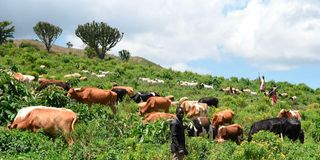Sh23bn funding boost for restoring degraded grazing lands

Alleged Illegal herders graze their animals at Berur farm in Moiben constituency of Uasin Gishu County on May 22, 2023, which is 1,300 acres.
What you need to know:
- The funding will expand climate-smart grazing practices.
- Conservation International and the Peace Parks Foundation launched the grassland restoration programme in collaboration with indigenous pastoralists, civil society organisations and the private sector.
A recent report by Oxfam reveals that millions of residents of Arid and Semi-Arid Lands (ASAL) are struggling due to drought.
The severe drought has seen people incur losses of approximately $7.4 billion solely from livestock. Limited grazing land has exposed the struggle and resilience of pastoralist communities in Northern Kenya. Grasslands, savannahs and shrublands serve as lifelines for approximately 50 million pastoralists and indirectly support more than 200 million people in Africa.
However, around 700 million hectares of these essential ecosystems have deteriorated, jeopardising water sources, carbon sequestration, and community livelihoods; a clear need for an urgent solution.
An ambitious initiative that aims to rejuvenate 20 million hectares of degraded grazing lands has secured $150 million (Sh23.4 billion), offering a brighter future for those reliant on these crucial ecosystems.
The funding will expand climate-smart grazing practices. Conservation International and the Peace Parks Foundation launched the grassland restoration programme in collaboration with indigenous pastoralists, civil society organisations and the private sector.
Christened "Herding for Health" , the initiative promotes conservation by teaching community members to escape extreme poverty by using their existing assets like livestock. Dr Seif Hamisi, rangelands director at Conservation International, says rotational grazing programmes offer numerous benefits to pastoralists beyond allowing grass to regenerate.
He asserts that reversing grassland deterioration is achievable through careful planning and community organisation. Dr Seif says rotational grazing involves communities using their available grazing land through a rotational plan. In this plan, pastoralists access local veterinary services in partnership with national and local governments and this eliminates the need for long treks and provides water for their livestock.
The programme trains herders to ensure proper livestock care, resulting in healthier livestock and improved market prospects throughout the year. The programme, which reduces livestock losses due to drought by managing the land within their control, has been successful in South Africa, Zambia and Mozambique.
In Kenya, the Mara and Chyulu regions are designated for piloting. Dr Seif says if it proves to be successful, the programme will address invasive species like the Mathenge plant, which inhibits smooth grazing. Collaborative farming also allows pastoralists to access better markets for their healthy livestock.
"Grasslands restoration will promote biodiversity, beekeeping, bird farming and tourism. The benefits are interconnected, all starting with healthy grazing lands," adds Dr Seif. Werner Myburgh, CEO of Peace Parks Foundation, says the programme encompasses all the elements necessary for conservation impact on a large scale, aligning with Peace Parks' Strategy 2030.
He notes that the programme will foster healthy landscapes, livestock, communities and coexistence between people and wildlife. African Senior Vice President and Chief Field Officer at Conservation International, Suzanne Ngo-Eyok, says the continent must approach pastoralism professionally and with a well-defined plan, addressing the urgency of sustainable production.
Ms Suzanne suggests that Africa must create a win-win scenario that engages communities through inclusion and capacity building. She says the "Herding for Health" programme accomplishes this by transforming herders into professionals who acquire health knowledge and gain access to disease control mechanisms like foot and mouth diseases.
In addition to grazing, livestock owners engage in other economic activities such as skin and hide processing, enhancing their livelihoods and creating opportunities for youth and women. She envisions that through the programme, both organisations will restore 20 million acres of grazing land by 2030 across eight countries.
"Botswana has embraced the system as part of their livestock entrepreneurship programme linked to job creation within their Agriculture Ministry. We are collaborating with the Kenya Forest Service and Kenya Wildlife Service to replicate this approach in Kenya," she explains.
The investment programme was discussed at the recent African inaugural summit aimed at fortifying Africa's climate resilience. Additional significant commitments include the United Arab Emirates pledging $4.5 billion to unleash Africa's clean energy capabilities and investing $450 million in carbon credits via the Africa Carbon Markets Initiative.
An agreement valued at $13 million with President Ursula von der Leyen of the European Commission will lead to the European Union's investment in Kenya's green hydrogen sector. At the same time, the United States Agency for International Development announced $35 million to empower communities to enhance their climate resilience and foster sustainable economic growth.




